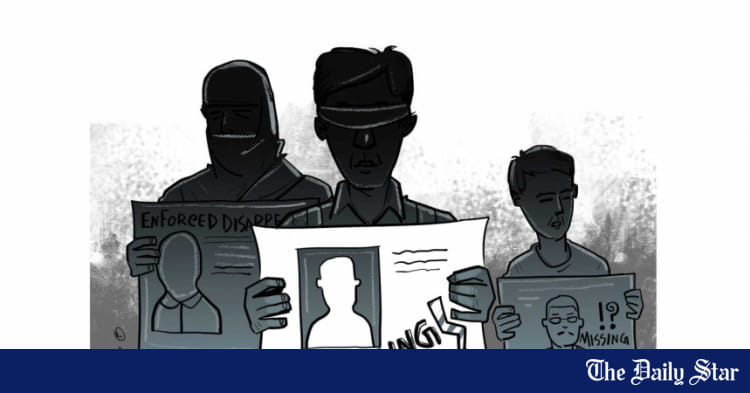Saif
Senior Member
- Messages
- 17,442
- Likes
- 8,381
- Nation

- Residence

- Axis Group


300 victims of enforced disappearances ‘killed’: Chief prosecutor
The International Crimes Tribunal (ICT) has set Jun 24 for submission of the investigation report in a case over enforced disappearances and extrajudicial killings allegedly committed over the last 15 years of Sheikh Hasina’s rule. The three-member tribunal, led by Justice Md Golam Mortuza M
300 victims of enforced disappearances ‘killed’: Chief prosecutor
Published :
Apr 20, 2025 19:29
Updated :
Apr 20, 2025 19:29

The International Crimes Tribunal (ICT) has set Jun 24 for submission of the investigation report in a case over enforced disappearances and extrajudicial killings allegedly committed over the last 15 years of Sheikh Hasina’s rule.
The three-member tribunal, led by Justice Md Golam Mortuza Mozumder, passed the order on Sunday following a plea from the prosecution, bdnews24.com reports.
Former Rapid Action Battalion director general Ziaul Ahsan, one of the accused in the case, was produced before the court during the hearing.
Chief Prosecutor Md Tajul Islam told the tribunal that “hundreds of extrajudicial killings and enforced disappearances” had taken place during the period.
He said, “Investigations into 200 disappearances are at the final stage. A total of 800 to 900 such cases have occurred. Among them, 300 victims were killed.
“The investigation agency has already gathered and is still gathering evidence on these crimes,” he added.
He requested two more months for submission of the full investigation report.
According to Tajul, arrest warrants were issued on Jan 6 against 11 individuals, including former prime minister Sheikh Hasina, over these alleged crimes against humanity.
Ziaul has already been arrested in connection with the case.
The investigation agency has so far visited several sites linked to enforced disappearances, including a so-called “detention centre” at the RAB-1 office in Uttara, where victims were allegedly kept.
Another location mentioned was a “disappearance chamber” at the RAB-2 office in Agargaon.
At the Kochukhet area, evidence was reportedly found in the infamous “Aynaghar” (Hall of Mirrors), known officially as the Joint Interrogation Cell.
According to the prosecution, torture equipment used on victims after abduction was also recovered from these locations.
Tajul claimed the structures of these locations have since been altered to destroy evidence, which has also been documented during the investigation.
The chief prosecutor alleged direct involvement of Hasina, her cabinet members, MPs, party leaders, and top officers of RAB, Counter Terrorism and Transnational Crime (CTTC) and other law-enforcing agencies in the disappearances and killings.
On Jan 6, the tribunal issued arrest warrants against 11, including Hasina, former defence advisor Tarique Ahmed Siddique, and former IGP Benazir Ahmed.
Hasina stepped down as prime minister on Aug 5, 2024, and has since remained in India.
The interim government took over following her resignation.
Over 50 complaints have so far been submitted to the tribunal against Hasina, her ministers, MPs, and senior Awami League leaders—many of them relating to enforced disappearances.
A commission on enforced disappearances formed by the interim government said in its report on Dec 15 last year that Hasina had been “directly involved” in ordering such acts over the last 15 years.
Published :
Apr 20, 2025 19:29
Updated :
Apr 20, 2025 19:29
The International Crimes Tribunal (ICT) has set Jun 24 for submission of the investigation report in a case over enforced disappearances and extrajudicial killings allegedly committed over the last 15 years of Sheikh Hasina’s rule.
The three-member tribunal, led by Justice Md Golam Mortuza Mozumder, passed the order on Sunday following a plea from the prosecution, bdnews24.com reports.
Former Rapid Action Battalion director general Ziaul Ahsan, one of the accused in the case, was produced before the court during the hearing.
Chief Prosecutor Md Tajul Islam told the tribunal that “hundreds of extrajudicial killings and enforced disappearances” had taken place during the period.
He said, “Investigations into 200 disappearances are at the final stage. A total of 800 to 900 such cases have occurred. Among them, 300 victims were killed.
“The investigation agency has already gathered and is still gathering evidence on these crimes,” he added.
He requested two more months for submission of the full investigation report.
According to Tajul, arrest warrants were issued on Jan 6 against 11 individuals, including former prime minister Sheikh Hasina, over these alleged crimes against humanity.
Ziaul has already been arrested in connection with the case.
The investigation agency has so far visited several sites linked to enforced disappearances, including a so-called “detention centre” at the RAB-1 office in Uttara, where victims were allegedly kept.
Another location mentioned was a “disappearance chamber” at the RAB-2 office in Agargaon.
At the Kochukhet area, evidence was reportedly found in the infamous “Aynaghar” (Hall of Mirrors), known officially as the Joint Interrogation Cell.
According to the prosecution, torture equipment used on victims after abduction was also recovered from these locations.
Tajul claimed the structures of these locations have since been altered to destroy evidence, which has also been documented during the investigation.
The chief prosecutor alleged direct involvement of Hasina, her cabinet members, MPs, party leaders, and top officers of RAB, Counter Terrorism and Transnational Crime (CTTC) and other law-enforcing agencies in the disappearances and killings.
On Jan 6, the tribunal issued arrest warrants against 11, including Hasina, former defence advisor Tarique Ahmed Siddique, and former IGP Benazir Ahmed.
Hasina stepped down as prime minister on Aug 5, 2024, and has since remained in India.
The interim government took over following her resignation.
Over 50 complaints have so far been submitted to the tribunal against Hasina, her ministers, MPs, and senior Awami League leaders—many of them relating to enforced disappearances.
A commission on enforced disappearances formed by the interim government said in its report on Dec 15 last year that Hasina had been “directly involved” in ordering such acts over the last 15 years.









